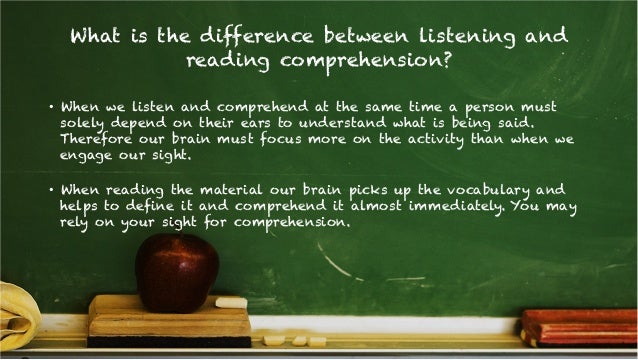
What is It?
Reading comprehension is the understanding and clarification of what is read. For a child to accurately comprehend written material, he/she must be able to decode what they read and have the capability to make connections between what they read and what the student may already know. Lastly, reading comprehension requires readers to think deeply about the text read.

What Does Research Say?
- Why is Reading Comprehension Important?
- It allows the reader to get meaning from text.
- It assists readers in developing knowledge, skills, and experiences he or she needs if they are to become enthusiastic readers.
- Reading comprehension improves vocabulary and language skills.
- Reading comprehension helps develop a reader’s imagination.
- What Are the Types of Reading Comprehension?
- Literal Meaning Comprehension- particular to what the text says. Literal meaning is actually what happens in a story (main idea, stated facts, sequence of events, characters in the story). This is an important type of comprehension because it is the foundation to deeper reader comprehension.
- Inferential Meaning Comprehension- this type of reading comprehension involves discovering what the text means. Inferential meaning requires a reader to think about a text and draw a conclusion from meaning that may not have been explicitly stated in the reading material. Generalizations, cause and effect relationships, future predictions, and unstated main ideas are all examples of inferential meaning comprehension.
- Evaluative Meaning Comprehension- evaluative meaning comprehension is determining what the text is telling the readers about the world outside of the story. Readers must use what they have read to form their own opinion based on the information read.
- Applied Meaning Comprehension- this particular level of comprehension is the response to a text based on the author’s language, values, imagery, style, and purpose.

- Why is Reading Comprehension so Difficult?
- Reading comprehension relies on mastery of decoding. Children who struggle with decoding often find it difficult to comprehend and remember what has been read.
- Poor readers work so hard to grasp and decode individual words that they have no resources left for reading comprehension.
Strategies for Comprehension
There are many, many strategies a teacher or parent can use to practice reading comprehension skills. I am providing 3 easy strategies that can be implemented to create fun, engaging comprehension practice lessons.
|
Visualizing
Teaching students to visualize what they are reading allows the readers to make mental images of the text and creates better reading comprehension. If a student can visual the text, they have a higher ability to recall what he/she has read. |
|
Predicting
Before diving into an entire text, allow the children to make informed predictions about the reading material. Allow them to use what they know about an author, title, or the story summary to predict what the text will be about. Good readers use predicting as a method to connect their existing knowledge to new information from a text to gain comprehension from what they read. |
|
Comprehension Monitoring
We should help our students learn how to monitor his or her thought processes as they read. This strategy engages the ability of readers to acknowledge when he or she understands what they read, when they may not comprehend the text, and knowing what works best to improve the student’s reading comprehension when it is blocked. |
Example Video
The link below is to a fun video to practice reading comprehension.